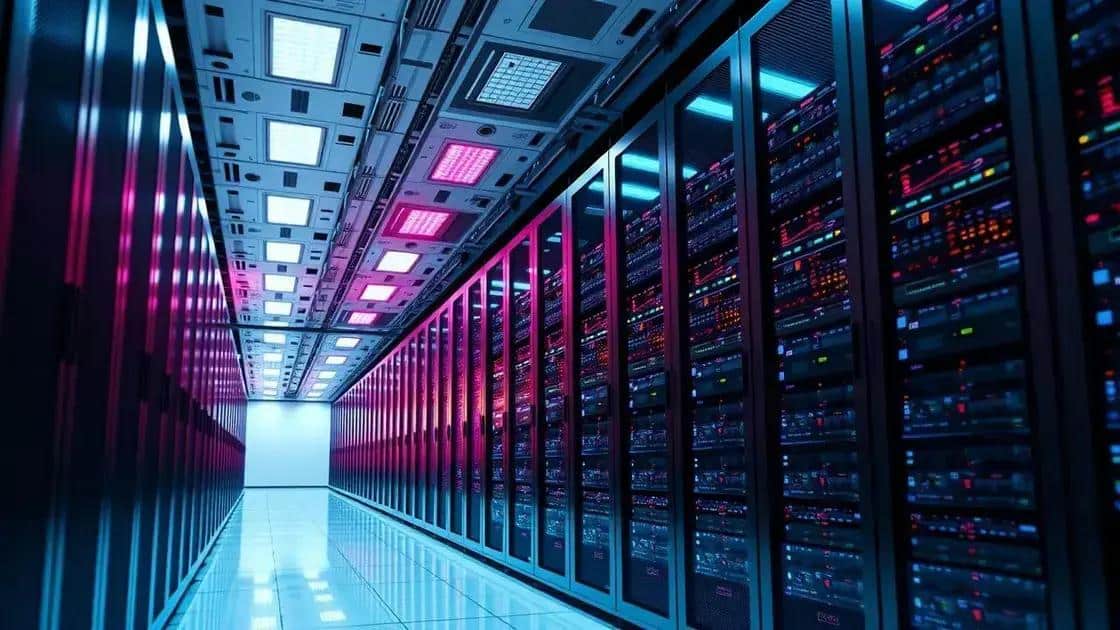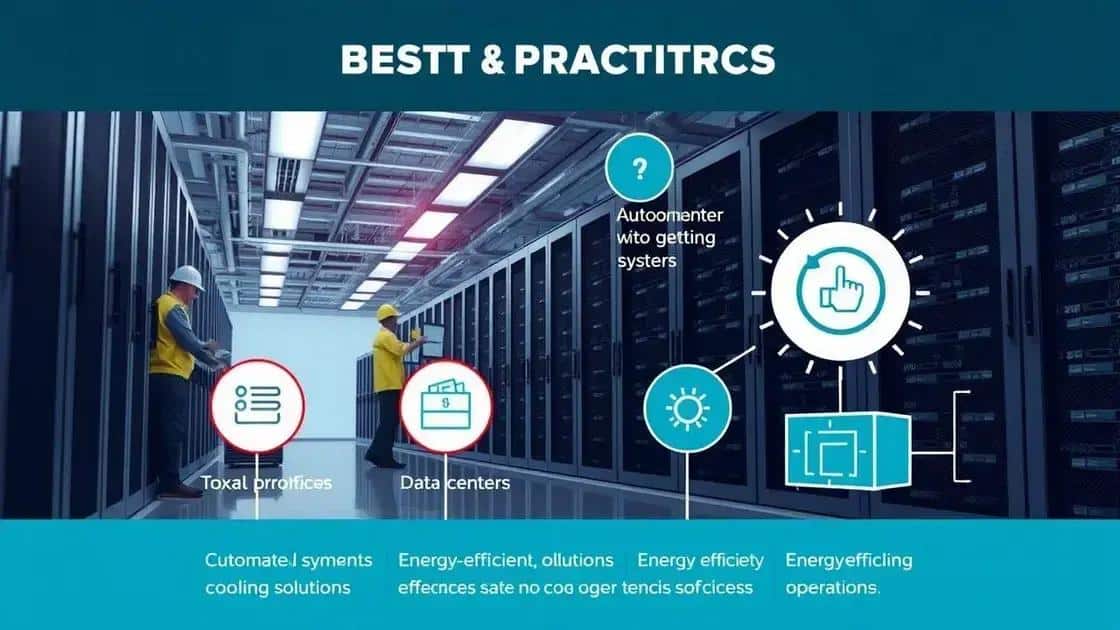Insights on data center efficiency news: what you need to know

Enhancing data center efficiency involves regular maintenance, automation, optimized cooling systems, and energy-efficient technologies, all of which improve performance and reduce operational costs.
Insights on data center efficiency news can provide valuable information on how to streamline operations and improve performance. Have you ever wondered how data centers play a key role in our digital world? Let’s dive into the latest updates together.
Understanding data center efficiency
Understanding data center efficiency is essential for maximizing performance and minimizing costs. In today’s digital landscape, efficiency plays a crucial role in how effectively data centers operate. But what exactly defines a efficient data center? Let’s explore.
Key Components of Data Center Efficiency
Efficiency in data centers revolves around various elements that work together to optimize performance. It involves hardware capabilities, energy consumption, and cooling management. A balanced combination of these factors contributes to an effective system.
- Energy management: Effective use of power helps reduce operational costs.
- Cooling solutions: Proper temperature control is vital to prevent overheating.
- Server utilization: Efficiently managing server resources can increase capacity.
- Virtualization: Minimizing hardware footprint is key to improving efficiency.
These factors don’t just lower costs; they can also significantly reduce the environmental impact of data centers. As the need for computing power grows, so does the importance of these strategies.
Evaluating Efficiency Metrics
To measure the efficiency of a data center, several metrics can be assessed. One of the most widely recognized is the Power Usage Effectiveness (PUE). This ratio helps determine how much energy is being used by IT equipment versus total energy consumption. A lower PUE indicates better efficiency, suggesting that a higher proportion of energy is used for computing rather than cooling and other overhead factors.
Another important metric is the Carbon Usage Effectiveness (CUE), which measures the carbon emissions associated with energy use in data operations. Monitoring these metrics is vital for maintaining operational efficiency and achieving sustainability goals.
Moreover, it’s essential to keep exploring innovations in technology. Advancements in artificial intelligence (AI) and machine learning (ML) can provide new ways to enhance data center efficiency. By analyzing operational data, AI can predict failures, optimize resource allocation, and automate cooling systems.
In summary, understanding data center efficiency involves a thorough evaluation of various components and metrics. By focusing on areas such as energy management, cooling solutions, and monitoring efficiency metrics, organizations can significantly improve their operations.
Latest trends in data center optimization

Latest trends in data center optimization are shaping how businesses manage their operations. Companies are constantly seeking new ways to enhance efficiency and reduce costs while maintaining high-performance levels.
Adoption of Cloud Technologies
One of the most significant trends is the growing adoption of cloud technologies. By utilizing cloud services, businesses can scale resources up or down based on demand, which leads to cost savings and improved flexibility. This shift to the cloud allows for efficient data storage and processing, minimizing the need for physical infrastructure.
- Enhanced scalability: Easily adjust resources as needed.
- Cost savings: Pay only for the services used.
- Improved collaboration: Access data from anywhere.
- Increased reliability: Rely on cloud providers for uptime.
Another emerging trend is the integration of green technologies in data centers. Implementing renewable energy sources and optimizing energy consumption not only reduces costs but also minimizes environmental impact. This commitment to sustainability is becoming a top priority for many organizations.
Artificial Intelligence in Operations
Artificial intelligence (AI) is also playing a crucial role in modernizing data centers. AI can optimize energy use, enhance cooling systems, and predict hardware failures before they occur. This proactive approach leads to improved performance and lower downtime.
Utilizing AI-based tools enables data centers to analyze real-time data and make informed decisions quickly. Additionally, machine learning can identify patterns that help in resource allocation and management, ensuring operations run smoothly without interruptions.
Furthermore, automation is another essential trend. By automating routine tasks in data centers, businesses can reduce human error and streamline operations. This allows staff to focus on more strategic initiatives rather than day-to-day maintenance.
Overall, incorporating these latest trends—cloud technologies, green initiatives, AI, and automation—into data center operations provides businesses with the ability to stay competitive while enhancing overall efficiency.
Factors impacting data center performance
Factors impacting data center performance are essential for optimizing operations and ensuring reliability. To achieve high levels of performance, it’s important to recognize the various elements that can either enhance or hinder efficiency.
Energy Efficiency
One key factor is energy efficiency. Inefficient energy systems can lead to high operational costs and reduced performance. By optimizing power consumption, organizations can improve their overall efficiency.
- Implementing energy-efficient cooling systems reduces power usage.
- Utilizing renewable energy sources can lower costs.
- Regular maintenance of power supplies is crucial for reliability.
Moreover, effective cooling solutions are vital in maintaining optimal temperatures for server operations. Overheating can result in hardware failures, causing downtime and loss of data.
Server Utilization
Another crucial factor is server utilization. If servers are not used to their full potential, performance suffers. It is important for any data center to monitor workloads and distribute tasks efficiently across servers.
Using virtualization technology can help maximize server utilization. By consolidating multiple workloads onto fewer servers, organizations can improve efficiency and reduce energy use. This also allows for more effective resource management.
Network performance is also critical. A slow network can lead to delays, impacting productivity. Ensuring that the network infrastructure can handle traffic efficiently is paramount for seamless operations.
Lastly, staff training and expertise play a significant role in data center performance. Skilled personnel can identify and resolve issues quickly, minimizing downtime. Regular training on new technologies and practices keeps teams informed and capable of handling complex systems.
Overall, by understanding and addressing the factors impacting data center performance, organizations can enhance operations, achieve better efficiency, and maintain a competitive edge in the digital landscape.
Best practices for enhancing efficiency

Best practices for enhancing efficiency in data centers help organizations streamline operations and reduce costs. Implementing these strategies can lead to improved performance and sustainability.
Regular Maintenance and Monitoring
One best practice is to conduct regular maintenance and monitoring of equipment. This ensures that hardware operates optimally. Scheduled maintenance minimizes the risk of failures and downtime.
- Perform routine checks on cooling systems.
- Update software regularly to fix bugs and improve performance.
- Monitor energy consumption to identify inefficiencies.
Proactive monitoring allows teams to detect issues before they escalate, contributing to a more reliable data center.
Implementing Automation
Another effective strategy is implementing automation for repetitive tasks. Automation can streamline processes, such as server provisioning and system updates. This reduces manual errors and frees up staff to focus on strategic initiatives.
By using management tools that automate routine tasks, organizations can enhance overall efficiency. These tools can optimize resource allocation and ensure that tasks are completed on time.
Optimizing Cooling Systems
Cooling systems play a crucial role in maintaining data center efficiency. Proper airflow and temperature control are vital in preventing overheating. Utilizing innovative cooling technologies, like liquid cooling or evaporative cooling, can significantly enhance performance.
Regularly assessing the cooling layout and making adjustments as needed is important. This can lead to energy savings and improved airflow, ensuring that all equipment operates within the ideal temperature range.
Furthermore, integrating energy-efficient practices can enhance sustainability. This includes using energy-efficient hardware and renewable energy sources. By focusing on these areas, data centers can minimize their environmental footprint while maximizing efficiency.
In summary, enhancing data center efficiency requires a combination of best practices and innovative strategies. Regular maintenance and monitoring ensure that all systems operate smoothly. Implementing automation can reduce manual work, making processes more efficient. Additionally, optimizing cooling systems, using energy-efficient technologies, and adopting cloud solutions can significantly improve performance. By focusing on these areas, organizations can create sustainable and cost-effective data centers that meet the demands of the digital age.
FAQ – Frequently Asked Questions about Data Center Efficiency
What practices can improve data center efficiency?
Regular maintenance, automation of tasks, optimizing cooling systems, and using energy-efficient technologies can significantly enhance data center efficiency.
How does automation benefit data center operations?
Automation reduces manual errors and frees up staff to focus on strategic initiatives, improving overall operational efficiency.
Why is energy efficiency important for data centers?
Energy efficiency lowers operational costs and minimizes the environmental impact, making data centers more sustainable.
What role does regular maintenance play in data center performance?
Regular maintenance prevents failures, ensures systems run smoothly, and helps identify issues before they escalate.






